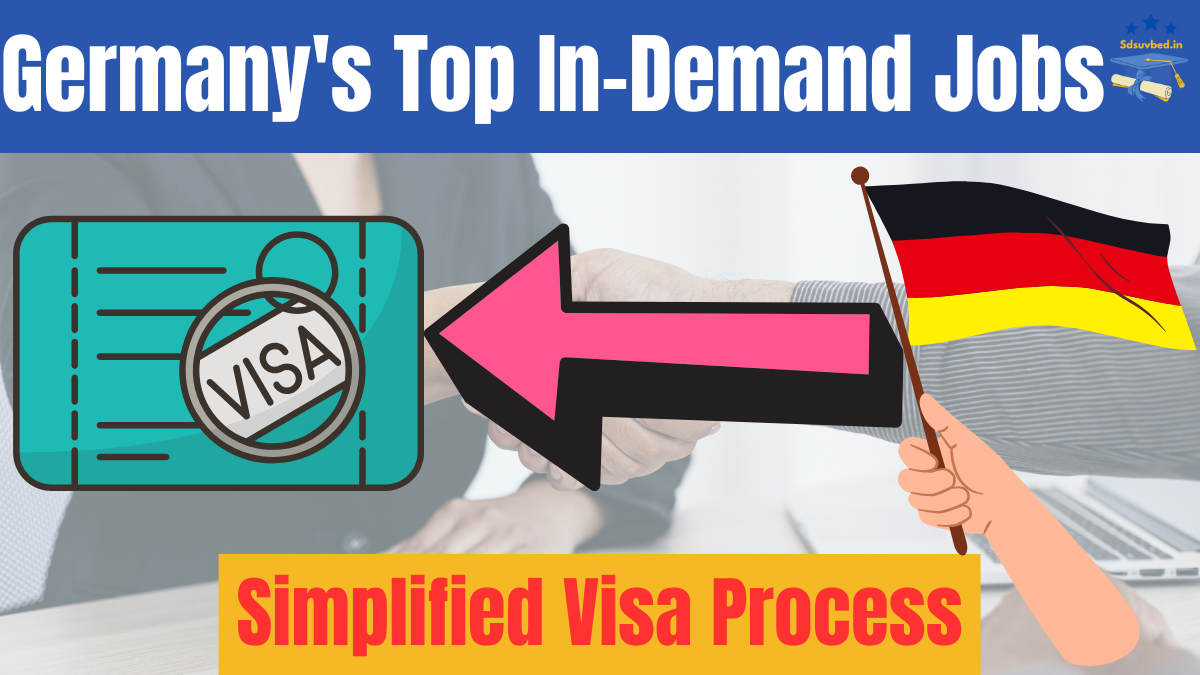Germany is facing critical labor shortages, with industries struggling to find skilled professionals to meet growing economic demands. To address this, the German government is expanding work visa programs and introducing simplified immigration policies in 2025. Skilled workers from various fields now have better opportunities to work and settle in Germany.
This article explores Germany’s most in-demand jobs, the latest visa options, and how foreign workers can take advantage of these new opportunities in 2025.

Why Does Germany Need More Foreign Workers?
Germany’s labor market is experiencing shortages due to:
- A declining birth rate leading to fewer working-age citizens.
- An aging population, with more people retiring than entering the workforce.
- Growing demands in key industries, particularly in technology, healthcare, and engineering.
To address these challenges, Germany has set a target of bringing in 400,000 skilled professionals annually to sustain economic growth and meet workforce demands.
Which Jobs Are in High Demand in Germany in 2025?
Germany has identified key industries facing severe labor shortages. Professionals in these fields are more likely to qualify for fast-tracked work visas and permanent residency options.
1. Healthcare and Medical Professions
- Doctors
- Nurses
- Elderly care assistants
With an aging population, Germany urgently needs healthcare professionals to support its medical and elderly care systems.
2. Engineering and Manufacturing
- Mechanical engineers
- Electrical engineers
- Civil engineers
Germany’s automotive, industrial, and renewable energy sectors rely heavily on skilled engineers.
3. Information Technology (IT) and Software Development
- Software developers
- Cybersecurity specialists
- AI and data scientists
With rapid digital transformation, IT professionals are in high demand for roles in cybersecurity, cloud computing, and automation.
4. Logistics and Supply Chain Management
- Truck drivers
- Warehouse managers
- Supply chain analysts
Germany is a major European trade hub, requiring skilled professionals to manage its growing logistics sector.
5. Education and Teaching
- Kindergarten teachers
- Primary school teachers
With a rising demand for international education, foreign language teachers and STEM educators are highly sought after.
6. Skilled Trades and Construction
- Electricians
- Plumbers
- Construction workers
Germany’s construction boom has led to an increased demand for skilled tradespeople, particularly in urban areas.
What Are the Visa Options for Foreign Workers in Germany?
Germany offers multiple visa pathways to attract skilled professionals. These include:
1. Chancenkarte (Opportunity Card)
- A points-based visa that allows skilled workers to enter Germany without a job offer.
- Points are awarded based on qualifications, language skills, and work experience.
- Workers can stay in Germany for one year while seeking employment.
2. Skilled Worker Visa (Blue Card)
- For highly qualified professionals in engineering, IT, and healthcare.
- Requires a job offer with a minimum salary threshold.
- Leads to permanent residency after 33 months (or 21 months with German language proficiency).
3. General Employment Visa
- Suitable for non-specialist jobs in fields such as logistics, hospitality, and skilled trades.
- Requires a job offer from a German employer.
4. Work Visa for Vocational Training and Apprenticeships
- For young professionals willing to undergo training in Germany.
- Provides a pathway to permanent employment upon completion.
How Can Foreign Workers Apply for a German Work Visa?
Applying for a work visa in Germany involves several steps:
Step 1: Check Eligibility
- Verify if your profession is in demand under Germany’s Skilled Immigration Act.
- Determine the best visa option based on your qualifications and experience.
Step 2: Secure a Job Offer (If Required)
- Use job portals like EURES, StepStone, and LinkedIn to apply for positions.
- Employers in shortage industries are more likely to sponsor work visas.
MUST READ: Armscor Bursaries 2025: How to Apply for Full Funding
Step 3: Gather Required Documents
- Valid passport
- Proof of qualifications and work experience
- Job contract (if applicable)
- Proof of financial stability
- German language proficiency certificate (if required)
Step 4: Submit Visa Application
- Apply at the German consulate or embassy in your home country.
- Processing times vary but typically take 6-12 weeks.
Step 5: Relocate and Register in Germany
- Upon arrival, register at the local residence office (Bürgeramt).
- Obtain a residence permit and start working legally.
Why Is 2025 the Best Time to Move to Germany for Work?
Germany’s relaxed immigration laws, increased visa quotas, and growing demand for skilled workers make 2025 an ideal time for foreign professionals to build their careers in the country.
With:
- Faster visa processing
- More job opportunities across industries
- Pathways to long-term residency
Now is the time to explore employment opportunities and take advantage of Germany’s evolving immigration policies.
Frequently Asked Questions (FAQs)
What is the Chancenkarte, and how does it work?
The Chancenkarte (Opportunity Card) is a points-based system that allows skilled professionals to enter Germany without a job offer. Points are awarded for education, work experience, age, and language skills.
Which professions are in the highest demand in Germany in 2025?
Germany is looking for healthcare professionals, engineers, IT specialists, teachers, and skilled tradespeople to fill labor shortages.
Do I need to know German to work in Germany?
Some roles, especially in IT and engineering, accept English-speaking professionals. However, learning basic German improves job prospects and integration.
How long does the German work visa process take?
Processing times range from 6 to 12 weeks, depending on the visa type and application volume.
Can I bring my family to Germany on a work visa?
Yes, visas like the EU Blue Card and SSW-2 allow family sponsorship, enabling spouses and children to join the applicant.
Is there an age limit for applying for a German work visa?
There is no specific age limit, but younger applicants may have a higher chance under the Chancenkarte system.
How can I increase my chances of getting a job in Germany?
- Apply in high-demand fields.
- Learn basic German to improve communication skills.
- Build a strong resume and apply through reputable job portals.
Click here to know more.
A passionate content writer specializing in creating engaging, SEO-optimized content. With expertise in blogs, web copy, and storytelling, I craft words that connect with audiences and deliver results.
